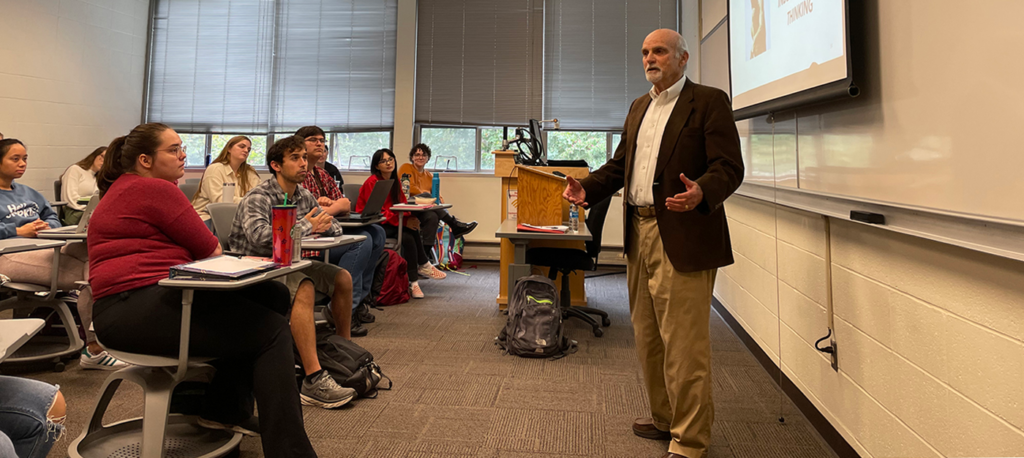Page 84 • (3,667 results in 1.612 seconds)
-
in language and job skills, as well as about the culture of the country in which they serve. Volunteers then serve for two years, working in a variety of areas, including agriculture, community economic development, education, environment, health, and youth in development. You can learn more about what volunteers do here. Beyond assisting local communities, volunteers gain real job skills through their work abroad, which can translate well to future employers. Peace Corps provides volunteers with
-

November 12, 2012 “The Other Side of Immigration” examines the impact migration has on the families that stay behind. “The Other Side of Immigration” By Katie Baumann ’14 PLU welcomed Roy Germano to campus this fall as part of the 2012 Department of Language and Literature Film Festival Series, to show his documentary, ‘The Other Side of Immigration.” This film explores why so many Mexicans leave their homes to migrate to the United States and explores another side of the issues surrounding
-
wanted to build on that good work by endowing a lecture series that addressed what she saw as a growing need — the spike in racist and anti-Semitic acts across the United States. The inaugural Natalie Mayer Holocaust and Genocide Studies Lecture, taking place on May 2, hosts language scholar and international expert Dr. Lid King, who will discuss how hate speech has flourished on the internet and detail how we must work to build a counter narrative. “My (hope) is to have scholars and artists come to
-
A Semester in NantesSarah Hubert, a BA Acting/Directing and Music double major with a minor in French, studied away in Nantes, France through IES in Spring of 2014. A sophomore at the time, Sarah describes how she found her program. After working with Carmen in the Wang Center, she ultimately chose to study in Nantes because it was an immersive language program in a smaller urban area with the opportunity to live with a host family, all of which equates to less English. The program also
-

found out some of the people I knew were gay, and I didn’t want to insult them or put a negative connotation to being gay,” Hoefer said. “I did not want to make those people feel uncomfortable with my language.” Which is the whole point of PLU’s powerful My Language/My Choice campaign: What you say can hurt, but what you don’t say can help. “Everyone hates feeling looked-down upon and feeling small in a situation and feeling uncomfortable,” Hoefer said. “By me not using those words, I don’t put
-
vice president, treasurer and general agent. All official business was conducted in Norwegian until 1918.Norwegian Language InstructionSchool was very important to the Scandinavian immigrants who came in the 1870s and 1880s in search of their own land, comfortable living and education for their children. Additionally, Norwegian fishermen and loggers came to PLU in their offseason to learn English. When the school opened, Harstad taught Religion, Latin, German and Norwegian; thus the Norwegian
-
253.535.7674 www.plu.edu/nursing/ nurs@plu.edu Rhoberta Haley, Ph.D., R.N., Dean Kathleen Richardson, D.N.P., Associate Dean Undergraduate ProgramsThe traditional undergraduate program is designed for students who do not hold licensure in practical or registered nursing. The L.P.N. to B.S.N. program is designed for Licensed Practical Nurses who have completed a practical nursing program. The school collaborates with nearly 100 health agencies to provide optimal clinical learning experiences for
-

manager at PLU. “It’s really crucial to have the perspective of the second-generation who experienced the aftermath of genocide, including migration and trauma,” Marcus says. For Marcus, a key to teaching about genocide lies in language, specifically propaganda. She studies how, in genocides and wartime, propaganda and hate speech contribute to dehumanization and violence and asks students to extrapolate how harmful, racist, and “othering” language used today could lead to the same dangerous end. “How
-
Language and Heritage Language, Hispanic Literature, Mexican Culture and History, and Mexican Film. He has worked at ICO since 2004, where he teaches international students, mainly from the USA, who visit Oaxaca as part of their study away programs at University of Chicago, Pacific Lutheran University, Virginia Commonwealth University, University of Montana, University of Wisconsin Stevens Point, Bard College, Indiana University South Bend, and more. He holds certificates from the Instituto Cervantes
-
Josh Smith Assistant Archivist and Digital Collections Specialist he/him/his Phone: 253-535-7882 Email: jds@plu.edu Professional Education M.L.I.S., Library and Information Science, University of Washington B.A., Spanish Language & Literature, International Relations, Pacific Lutheran University
Do you have any feedback for us? If so, feel free to use our Feedback Form.


